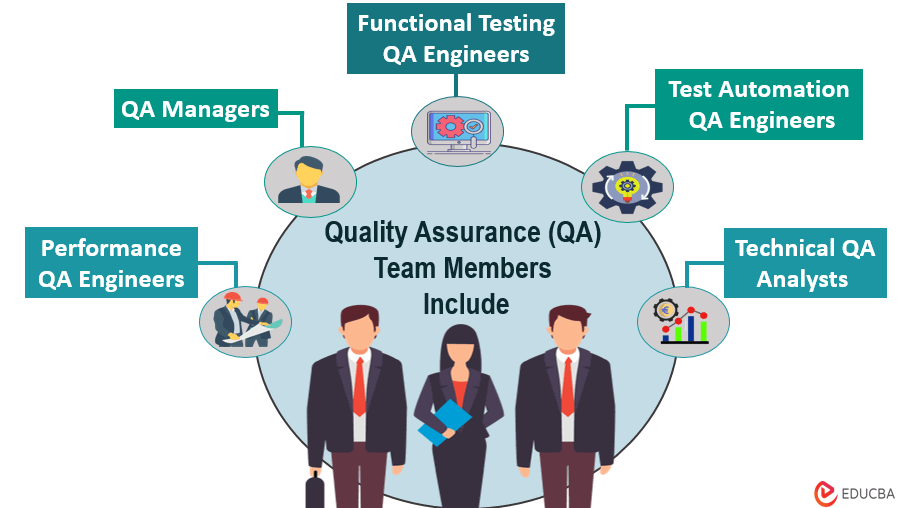Updated November 17, 2023
Introduction to Quality Assurance Team Members
Quality Assurance (QA) is crucial in the ever-changing app development world. It guarantees flawless user experiences on web and mobile platforms. The quality assurance team members test and validate functionality, usability, security, compatibility, and performance. They focus on cross-browser testing to ensure platform consistency, quickly identifying and fixing issues.
What Is Quality Assurance?
Quality Assurance (QA) is a systematic process of establishing and maintaining standards, policies, and practices to prevent and address quality issues in the development of applications. It involves evaluating the application’s effectiveness, performance, and quality, including user interface, stability, and bug fixes.
What Do Quality Assurance Team Members Do?
Collaborating with development teams and quality assurance team members speed up development cycles, improves accuracy, and streamlines testing. QA teams, usually small groups of specialists, scrutinize code from multiple engineers. This teamwork addresses the complexity of modern applications and supports automation testing goals.
A skilled and cohesive QA team significantly impacts the success of the app development process, ensuring robust testing practices and delivering high-quality software to users. QA teams conduct testing throughout development to identify and address faults, ensuring that the released applications meet user expectations.
Thus, following guidelines for selecting and training members is beneficial.
Members of a Quality Assurance Team
A Quality Assurance (QA) team plays a crucial role in ensuring the quality and reliability of applications. Key members of the QA team include:
1. Functional Testing QA Engineers
- Responsibility: Conduct manual quality assurance testing to ensure applications meet functional and non-functional objectives.
- Tasks: Thorough testing of regression, integrations, and application speed in pre and post-release stages.
2. Test Automation QA Engineers
- Responsibility: Develop automated testing scripts in collaboration with manual engineers to identify errors and faults.
- Tasks: Create reusable tests for various projects, assess application speed, and adhere to testing standards.
3. Technical Quality Assurance Analysts
- Responsibility: Craft testing plans, evaluate critical features, and supervise documentation during the testing process.
- Tasks: Guide team activities, plan testing schedules, and ensure adherence to established processes throughout development.
4. QA Managers
- Responsibility: Ensure effective communication between team members and clients, facilitate team functioning, and provide regular reports and updates.
- Tasks: Collaborate with end users to create standards, guide team members, and oversee the smooth operation of the QA process.
5. Performance QA Engineers
- Responsibility: Specialize in testing applications under heavy user loads to ensure proper functioning.
- Tasks: Rigorously test for bugs that could arise from a sudden increase in user activity.
Qualifications for a Successful QA Career
- Skill Development: Stay updated on tech trends and developments in the field due to its fast-paced nature.
- Adaptability: Pursue ongoing professional development to stay relevant in the ever-changing technology landscape.
- Foundation Degree: A technical degree like computer science, information systems technology, or software engineering provides a solid base for a QA professional.
- Online Resources: Take advantage of online self-study courses to enhance your skills.
Key Selection & Training Factors
When establishing a strong Quality Assurance (QA) team, focus on these attributes:
1. Domain Expertise
- Criteria: In-depth knowledge aligning with industry standards and organizational practices.
- Importance: Ensures comprehensive testing in accordance with domain-specific rules, laws, and standards.
2. Attention to Detail
- Criteria: Meticulous attention to detail and sharp observational skills.
- Importance: Critical for effective bug identification, resolution, and maintaining accurate documentation.
3. Communication Skills
- Criteria: Proficient communication in both technical and non-technical contexts.
- Importance: Serves as a bridge between stakeholders, project managers, and developers, facilitating seamless collaboration.
4. Technical Proficiency
- Criteria: Strong technical background, including programming languages, testing methodologies, and automation skills.
- Importance: Empowers problem-solving, advanced research, and a deep understanding of application development procedures.
5. Solution-Focused Attitude
- Criteria: Patience, determination, and a proactive approach to problem-solving.
- Importance: Essential for identifying, addressing, and providing solutions to challenges while maintaining a positive team and client relationship.
6. Time Management
- Criteria: Exceptional organizational and time management skills.
- Importance: Ensures the team meets project deadlines, managing multiple tasks and projects simultaneously.
7. Critical Thinking Abilities
- Criteria: Advanced analytical and critical thinking skills.
- Importance: Actively identifies and resolves design flaws, addresses issues at their root, and provides practical solutions.
8. Adaptability and Flexibility
- Criteria: Adapting to evolving industry trends and project specifications.
- Importance: Enables the team to adjust testing strategies in response to dynamic project requirements.
9. Commitment to Training and Development
- Criteria: Active participation in offline and online training courses.
- Importance: Keeps the team abreast of the latest technologies, tools, and industry best practices, fostering continuous improvement.
Streamlining QA Testing with LambdaTest
LambdaTest supports quality assurance team members with comprehensive training and certification opportunities, ensuring proficiency in the latest testing methodologies. The AI-powered test orchestration platform facilitates collaboration, knowledge sharing, and participation in various learning activities, including online courses, webinars, workshops, and conferences.
The platform’s AI-powered testing infrastructure allows QA teams to automate tests using popular frameworks like Selenium, Cypress, Playwright, and Puppeteer across 3000+ environments, real mobile devices, and browsers. The ability to run tests in parallel reduces testing efforts, and LambdaTest’s automatic generation of full-page screenshots aids visual testing. Seamless integration with bug-tracking systems and CI/CD technologies streamlines the overall testing process, contributing to high-quality app development and meeting user expectations.
Recommended Articles
We hope you found this comprehensive article on Quality Assurance Team Members helpful. For similar articles, please refer to the following.



